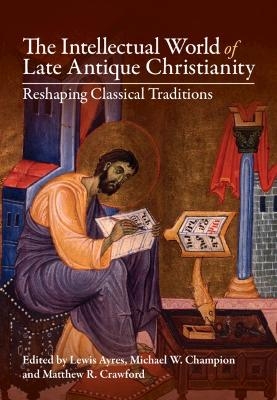
The Intellectual World of Late Antique Christianity
Cambridge University Press (Verlag)
978-1-108-83529-9 (ISBN)
The Intellectual World of Late-Antique Christianity explores new perspectives on early Christian epistemology in relation to the changing discourses, institutions, and material culture of late antiquity. Early Christian modes of knowing and ordering knowledge involved complex processes of appropriation, reproduction, and reconfiguration of Jewish and classical epistemologies. This helped Christians develop cultures of interpretation and argument as textually oriented religious communities within the Roman Empire and beyond. It laid an intellectual foundation that would be built upon and modified in a variety of later contexts. Encompassing Greek, Latin, and Syriac Christianity, and an historical arc that stretches from the New Testament to Bede, this volume traces how diverse theological commitments resulted in distinctive Christian accounts of knowing. It foregrounds the myriad ways in which early Christian epistemology was embedded in earlier intellectual traditions and forms of life, and how they established norms for communal life and powerful ways of acting in the world.
Lewis Ayres is Professor of Catholic and Historical Theology at Durham University and Professorial Fellow at the Institute of Religion and Critical Inquiry, Australian Catholic University. He is the author of Nicaea and Its Legacy (2004) and Augustine's Trinitarian Theology (2010). Michael Champion is Associate Professor and Director of the Australian Catholic University Node, Australian Research Council Centre of Excellence for the History of Emotions. His most recent book is Dorotheus of Gaza and Ascetic Education ( 2022). Matthew R. Crawford is Associate Professor and Director of the Program in Biblical and Early Christian Studies at the Institute for Religion and Critical Inquiry at Australian Catholic University. He is the author, most recently, of The Eusebian Canon Tables (2019).
1. Modes of knowing and the ordering of knowledge in early Christianity Lewis Ayres, Michael Champion, Matthew R. Crawford; 2. The beginnings of a Christian doctrine of the spiritual senses before Origen Jane Heath; 3. Health, medicine, and philosophy in the school of Justin Martyr Jared Secord; 4. The structure of the ascetic self in Irenaeus of Lyons Paul Saieg; 5. The order of education and knowledge in clement of Alexandria Matyáš Havrda; 6. Origen's institutions and the shape of biblical scholarship Peter Martens; 7. Dialogue and catalogue: Fate, free-will, and epistemology in the Book of the Laws of the Countries Scott Johnson; 8. Iamblichus on divination and prophecy Peter Struck; 9. Cyprian, scripture and socialisation: forming faith in the catechumenate and beyond Edwina Murphy; 10. Sacrificial knowing: Cyprian and early Christian ritual knowledge Andrew McGowan; 11. Learning the language of God: tables in early Christian texts Andrew Riggsby; 12. The Aëtian Placita and the church fathers: creative use of a distinctive mode of ordering knowledge David Runia; 13. Nicaea's frame: the organisation of creedal knowledge in late antiquity and modernity Andrew Radde-Gallwitz; 14. The Arian controversy and the problem of image(s) Rebecca Lyman; 15. Imaging Ephrem the author Jeffrey Wickes; 16. Homilies as 'Modes of Knowing': an exploration on the basis of Greek patristic sermons (ca. 350-ca. 450 CE) Johan Leemans; 17. Dissemination of biblical narratives, motifs, and figures through early Christian inscriptions and homilies Cilliers Breytenbach; 18. How to make use of pagan knowledge without separating oneself from the church's milk: the function of otherness in Gregory of Nyssa's theory of self-perfection Jan Stenger; 19. Female characters as modes of knowing in late imperial dialogues: the body, desire, and the intellectual life Dawn LaValle Norman; 20. The Christianity of Latin Christian poetry Mark Edwards; 21. Ambrose's hymns as modes of knowing the 'Real' Brian Dunkle; 22. Confused voices: sound and sense in the later Augustine Carol Harrison; 23. Precision and the limits of human autopsy in Augustine's critique of pagan divination Michael Hanaghan; 24. Duplex via: authority and reason at Cassiciacum Gerald Boersma; 25. The object of our gaze: visual perception as a mode of knowing Robin Jensen; 26. Reconsidering the tholos image in the Eusebian canon tables: symbols, space, and books in the late antique Christian imagination Matthew Crawford; 27. Condemning the glutton of the monastery: rhetorical strategies and the epistemology of Philoxenus of Mabbug Jeanne-Nicole Mellon Saint-Laurent; 28. Evagrius of Ponticus on lupē: Distress and cognition between philosophy, medicine, and monasticism Jonathan Zecher; 29. Liturgical modes of knowing: coming to know God (and oneself) in sixth-century hymns and homilies Sarah Gador-Whyte; 30. Prolegomena to philosophy and the ascetic ordering of knowledge Michael Champion; 31. Bureaucratic modes of knowing in the late roman empire Sara Ahbel-Rappe; 32. The dissemination and appropriation of legal knowledge in the age of Justinian Peter Sarris; 33. The ordering of knowledge in four late patristic Christological handbooks Dirk Krausmüller; 34. World and empire: contrasting the cosmopolitan visions of Maximus the Confessor and George of Pisidia in seventh century Byzantium Paul Blowers; 35. Boethius on the ordering of knowledge John Magee; 36. Ordering emotional communities: modes of knowing in Gregory the Great Bronwen Neil; 37. Creating knowledge and knowing creation in late antique theological and scientific writing Helen Foxhall Forbes; 38. Hierarchies of knowledge in the works of Bede Zachary Guiliano; 39. Epilogue Teresa Morgan.
| Erscheinungsdatum | 10.11.2023 |
|---|---|
| Zusatzinfo | Worked examples or Exercises |
| Verlagsort | Cambridge |
| Sprache | englisch |
| Maße | 178 x 240 mm |
| Gewicht | 1920 g |
| Themenwelt | Geisteswissenschaften ► Geschichte ► Regional- / Ländergeschichte |
| Geschichte ► Teilgebiete der Geschichte ► Religionsgeschichte | |
| Religion / Theologie ► Christentum ► Kirchengeschichte | |
| Geisteswissenschaften ► Religion / Theologie ► Judentum | |
| ISBN-10 | 1-108-83529-5 / 1108835295 |
| ISBN-13 | 978-1-108-83529-9 / 9781108835299 |
| Zustand | Neuware |
| Informationen gemäß Produktsicherheitsverordnung (GPSR) | |
| Haben Sie eine Frage zum Produkt? |
aus dem Bereich


